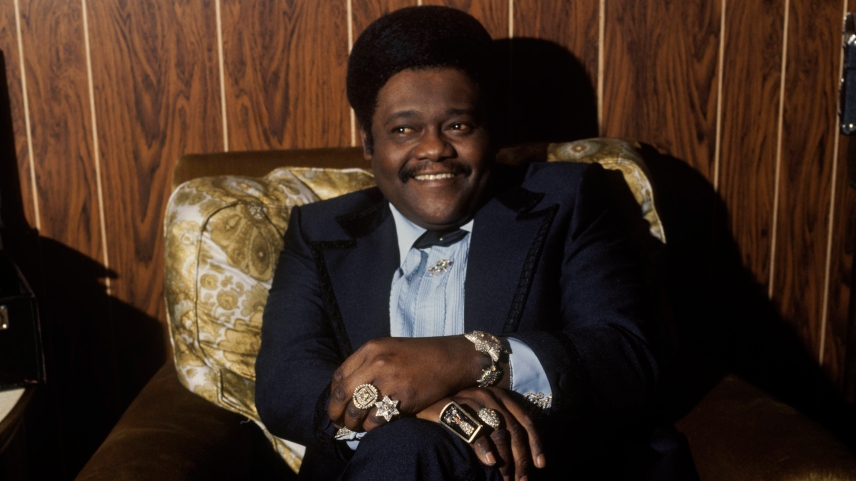Home » Posts tagged 'Herbert Hardesty'
Tag Archives: Herbert Hardesty
FATS DOMINO
October 30, 2017 2:23 am / Leave a comment

This week for our cultural article, we will be celebrating the life of Fats Domino: the legendary New Orleans rock ‘n’ roller who died last Tuesday at the age of eighty-nine.
Fats Domino was born Antoine Dominique Domino, Jr. on February 26th, 1928, in New Orleans, Louisiana. He was the youngest of Antoine Caliste Domino’s (1879 – 1964) and Marie-Donatille Gros’ (1886 – 1971) eight children. and introduced him to New Orleans’ music scene, which would be a major influence on his later music. Fats’ came from a musical family. At seven-years-old, he was taught to play the piano by his brother-in-law, Harrison Verret (1907 – 1965). Additionally, Verret also introduced Fats to the New Orleans’ music scene, which would become a major influence on his later music.
By the age of ten, Fats was performing as a singer and a pianist. Four years later, he dropped out of school completely to pursue a career in music. To support himself during this time, Fats took on odd jobs – factory work, hauling ice, and so forth. By 1946, Fats had begun playing leading piano with the well-known New Orleans bass player and bandleader, Billy Diamond (1916 – 2011). It was Diamond who gave Domino the nickname, “Fats”. Years later, Diamond would reminisce:
“I knew Fats from hanging out at a grocery store. He reminded me of Fats Waller and Fats Pichon. Those guys were big names and Antoine—that’s what everybody called him then—had just got married and gained weight. I started calling him ‘Fats’ and it stuck.”
Diamond’s audiences were impressed by Fat’s rare talents and by the end of the 1940s the New Orleans’ pianist had attracted a very substantial following. As a musician, Fats was versed in numerous musical styles – blues, boogie-woogie, ragtime – and had drawn inspiration from pianists like Meade Lux Lewis (1895 – 1964) and singers like Louis Jordan (1908 – 1975).
In 1949, Fats met his long-term collaborator, Dave Bartholomew (1920 – ). Around the same time, Fats signed a record contract with Imperial Records. Fats’ first song with the label, The Fat Man (a play on his own nickname), would sell a million copies and reach number two on the Rhythm and Blues Charts.
Fats stood out as a performer due to the combination of his baritone voice, unique piano-playing style, the saxophone rifts of Herbert Hardesty (1925 – 2016), and the drum after-beats of Earl Palmer (1924 – 2008). The release of Ain’t That A Shame in 1955 exposed Fats to the mainstream public and helped make him the most popular African American rock ‘n’ roll artist. His upward trajectory continued with two film performances in 1956: Shake, Rattle and Rock, and the Girl Can’t Help It, and the recording of five top-forty hits, including, My Blue Heaven, and Blueberry Hill (which reached number two).
By the early 1960s, however, Fats music had lost much of its original popularity. In 1963, he moved to ABC-Paramount Records and parted ways with his long-time collaborator, Dave Bartholomew. The arrangement would be short lived with Fats parting ways with ABC-Paramount, returning to New Orleans, and rekindling his professional relationship with Dave Bartholomew in 1965.
Fats and Bartholomew would collaborate until 1970, culminating in the 1968 cover of The Beatles’ Lady Madonna (ironically, a tribute to Fats Domino in and of itself). During this time, Fats failed to experience significant chart success. In 1986, Fats was inducted into the Rock and Roll Hall of Fame as part of their inaugural lists.
Fats retired from touring following a health scare in Europe in 1995. Outside of the occasional performance at the New Orleans’ Jazz and Heritage Festival, he lived a mostly private life with his wife, Rosemary Hall (1930 – 2008), and his eight children. In 1998, Fats accepted a National Medal of the Arts from President Bill Clinton (1946 – ).
Fats refused to leave New Orleans – and abandon his sick wife – during Hurricane Katrina. His home was badly flooded and he lost most of his possessions. He was rescued by the Coast Guard on September First. Following the disaster, Fats released Alive and Kicking and donated a proportion of the sales to the Tipitana Foundation which helped New Orleans’ struggling musicians.
Following the album’s release, Fats retreated back into private life and largely shunned publicity. In 2008, Rosemary Hall, his wife of fifty years, died of chronic illness. Fats joined her on October 26th, 2017, at the age of eighty-nine.
Fats Domino must be credited as a key pioneer of rock ‘n’ roll. Together with Jerry Lee Lewis (1935 – ) and Little Richard (1932 – ), Fats style of piano playing helped define the new genre of music and inspired dozens of future musicians. No wonder The Rolling Stone Record Guide likened him to Benjamin Franklin (1706 – 1790).
